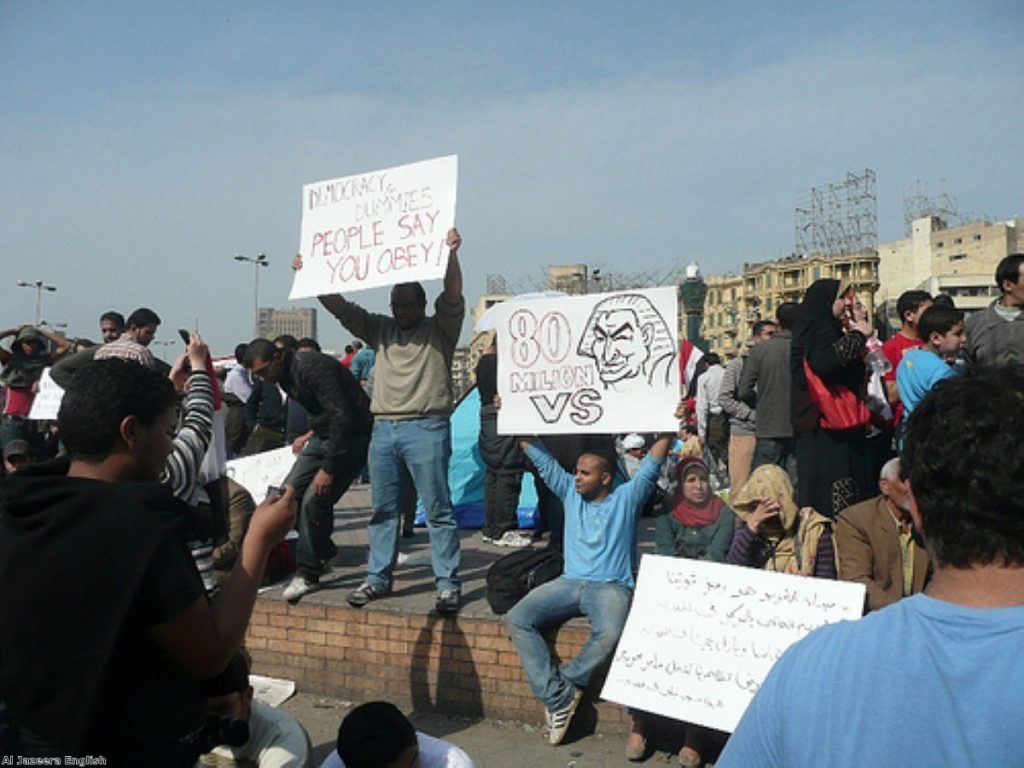EU leaders line up against Egypt intimidation
EU leaders have united to pressure Egypt for “political reform” – but declined to call for president Hosni Mubarak to step down.
The joint statement issued after a summit in Brussels came as a ‘day of departure’ protest in Cairo’s Tahrir Square progressed largely peacefully.
Groups of “thugs” ransacked Al Jazeera’s Cairo offices as media intimidation continued, however, while some running battles were reported off the main Tahrir Square demonstration.


Earlier David Cameron said any attempt to deploy “state-sponsored thugs” in Egypt would see the regime lose any remaining credibility with Britain and the world.
The EU declaration underlined that sentiment by condemning “all those who use and encourage violence”.
Up to 5,000 people are thought to have been hurt so far in demonstrations against the government.
Opposition figureheads were seeking a ‘final push’ against president Hosni Mubarak, who continues to resist international pressure to stand down immediately.
“We have been clear that Egypt should be taking steps to show there is a clear, credible transparent path towards transition,” Mr Cameron said.
“So far the steps taken have not met the hopes of the people. EU leaders today have to come together to show they support that orderly transition.”
UN secretary-general Ban Ki-moon also condemned “violence and intimidation”, calling curbs on the media “completely unacceptable”.
Thousands who slept in Cairo’s Tahrir Square overnight were joined by many more arriving from both outside and inside the city carrying food and water.
Among those attending today’s protest was the much-respected Arab League secretary-general, Amr Moussa, who was reportedly consider running for president.
State media reported 18 journalists arrested yesterday had been replaced. Pro-government backers reportedly gathered for a ‘day of loyalty’ in response to the opposition slogan.
The general tone of the protests was more muted than on previous days. Piles of rocks and stones were being made in Tahrir Square, as Egypt braced for more potential violence, however.
“Any attempt to restrict the free flow of information, including aggression and intimidation directed against journalists and human rights defenders, is unacceptable,” the EU statement added.
“The European Council called on the Egyptian authorities to meet the aspirations of the Egyptian people with political reform not repression.
“All parties should show restraint and avoid further violence and begin an orderly transition to a broad-based government.”
Last night new vice-president Omar Suleiman appealed to protesters to “end your sit-in”, telling them their demands have already been answered.
President Mubarak has said he does not want to remain in office beyond elections later this year, but fears exiting now because of the unrest that would create.
Opposition figureheads responded by hailing Friday as a ‘day of departure’ in which they bid to oust the president.
The military, which has avoided taking sides so far, could play a critical role as President Mubarak clings to power.
The US government is reportedly proposing behind closed doors that he quits immediately and is replaced by a transitional government headed by Mr Suleiman.
“I was very unhappy,” Mr Mubarak said yesterday of Wednesday’s protests. “I do not want to see Egyptians fighting each other.”
Opposition leader Mohamed ElBaradei told the Al Jazeera news channel he wanted President Mubarak to stand down immediately.
“He served his country, made mistakes, but now it is time to leave,” CNN quoted him as saying.
“Mubarak is a military man; he should be able to tell when it’s time to leave.”

